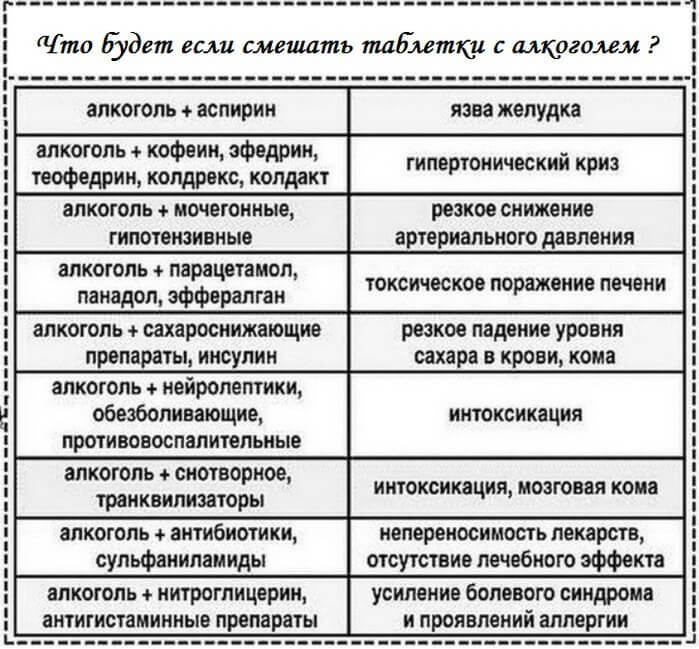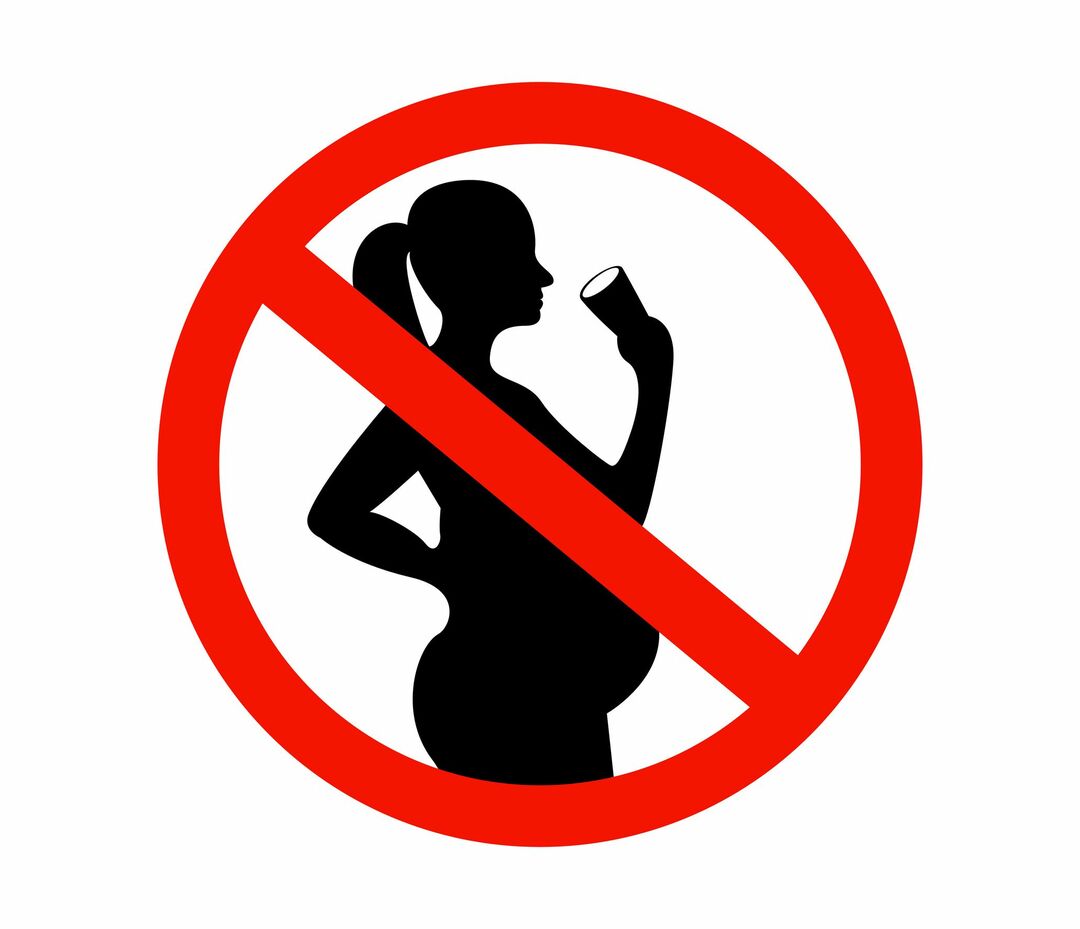Glycine: instructions for use, analogues
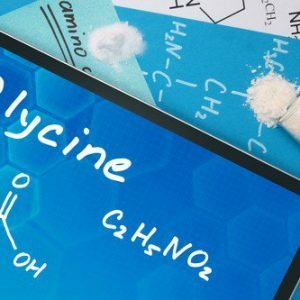
Glycine is an effective drug that stimulates metabolic processes in the brain and has calming properties.This tool helps to normalize sleep, improve attention and reduce the negative impact of stress.
Table of contents: Active substance and formulation In which cases can not Glycine be taken?Can Glycine be consumed by pregnant women?How to take Glycine?How does this medicine work?Side effects Interaction with other drugs Advanced Storage rules and dispensing conditions from pharmacies Analogues GlycineActive substance and form
The active substance of sublingual tablets is microencapsulated amino acid glycine.
The drug is supplied in packs of 50 pcs.In each of them, 100 mg of the active ingredient is present.
When should I take Glycine?
The agent is prescribed for the following pathologies:
-
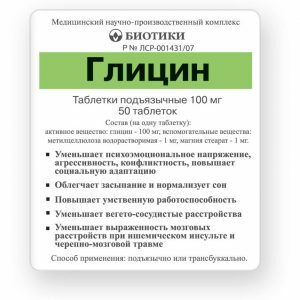 stroke( ischemic type);
stroke( ischemic type); - transferred to the CCT;
- consequences of infectious diseases of the brain;
- psychoemotional stresses;
- decreased attention;
- impairment of cognitive abilities;
- social deviation( deviation) in adolescents;
- neurosis-like conditions;
- vegetative-vascular dystonia( incl. With menopause);
- excessive emotional lability;
- insomnia;
- encephalopathy in the background of chronic alcohol poisoning.
When should Glycine not be taken?
The vast majority of patients are well tolerated by this drug.
Glycine is contraindicated only to persons with hypersensitivity to the active ingredient.
Can Glycine be consumed in pregnancy?
Glycine is well absorbed, but does not penetrate the hematoplacental barrier, so it is perfectly safe for the unborn child. The drug is approved for use at any time of pregnancy. Amino acid is not found in breast milk, so lactation is not a contraindication for Glycine's course therapy.
How to take Glycine?
 A unique drug for improving brain metabolism is recommended for course therapy.
A unique drug for improving brain metabolism is recommended for course therapy.
Important: if indicated Glycine is used to treat children younger than 3 years old!
The tablets are placed under the tongue and await complete resorption.To children they are given, preliminary crushed to a powder state.
In case of stress, attention disturbance and behavioral disorders in children, a single dose, regardless of age, is 100 mg( 2-3 times a day). The duration of the course varies from 2 to 4 weeks( determined by the attending physician).
For lesions of the nervous system, emotional lability, excessive excitability and sleeping problems, dosages are determined according to the age of the patient.
Up to 3 years - ½ tab.Twice a day for 7-14 days.Then they switch to "maintenance" dosages - ½ tab.Once a day from 1 to 1.5 weeks .
Children under 3 years of age and adults should take 1 tablet each.2-3 times a day from 7 to 14 days .If there are indications, the course is extended to 1 month.If there is evidence, it is possible to repeat the course therapy after a month's break.
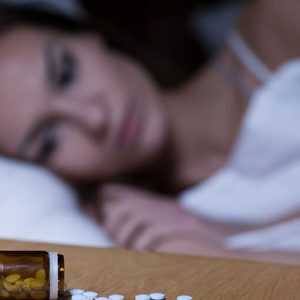 In case of insomnia, the patient should take ½-1 tablets.in evening time.
In case of insomnia, the patient should take ½-1 tablets.in evening time.
If a stroke is of ischemic origin, then the victim should be given 1000 mg.Glycine with a small amount of water in the first hours from the appearance of clinical signs of acute cerebrovascular insufficiency .In the next 5 days, appoint 1000 mg, and then within a month for 100-200 mg three times a day.It is recommended to observe approximately the same time intervals between receptions.
Narcologists prescribe an amino acid to patients during the rehabilitation period to reduce the severity of the symptoms of encephalopathy and relieve the mental stress of .Single dose - 1 tab., And the frequency of reception - 2-3 times a day.Therapy for alcoholism and drug addiction continues for 2 to 4 weeks;Courses can be held up to 6 times a year, taking breaks.Reception Glicin warns of manifestations of aggression, improves mood and general vitality, and accelerates the process of social adaptation.
How does this medicine work?
 Amino acid glycine exerts a sedative effect by activating the inhibitory processes in the central nervous system. It stimulates brain metabolism, protecting the nervous system from stress and increasing the activity of cognitive processes.The drug has a regulating effect on glutamate receptors and acts as an adrenoblocker, which improves sleep.It is characterized by pronounced antioxidant properties and is able to reduce the level of toxic metabolic products.
Amino acid glycine exerts a sedative effect by activating the inhibitory processes in the central nervous system. It stimulates brain metabolism, protecting the nervous system from stress and increasing the activity of cognitive processes.The drug has a regulating effect on glutamate receptors and acts as an adrenoblocker, which improves sleep.It is characterized by pronounced antioxidant properties and is able to reduce the level of toxic metabolic products.
The complex effect of Glycine helps to reduce the severity of symptoms of vegetative-vascular disorders and accelerates the normalization of brain functions after trauma, neuroinfections and acute circulatory failure.
Many patients who underwent treatment indicated that they were no longer bothered by headaches, and the memory capacity improved significantly.
From the sublingual area, rich in blood vessels, the medicine is absorbed into the bloodstream as soon as possible, distributed in tissues and biological fluids.During biotransformation, the amino acid decomposes to carbon dioxide and water.Glycine is not cumulated in the body.
Side effects of
In very rare cases, the development of hypersensitivity reactions( allergies) is possible.Information about other undesirable actions of Glycine is not available at the moment.
Note: individual patients complain of not elevated drowsiness, agitation or fits of weakness, but this is most likely due to purely individual reactions from the nervous system.
Interaction with other drugs
Glycine reduces side effects after taking antidepressants, tranquilizers, hypnotics and antipsychotics.
Amino acid reduces the inhibitory effect of ethyl alcohol( alcohol) on the central nervous system.
Optional
During the operation of resection of the prostate with a local application of Glycine, it enters the bloodstream. There is a probability of the effect of the substance on the kidneys, cardiovascular and respiratory systems.
Rules for storage and dispensing conditions from pharmacies
To purchase Glycine tablets, you do not need a doctor's prescription.
The drug should be stored in a dry and dark place.Permissible storage temperature is not higher than + 25 ° С.
The drug can be used for 3 years from the date of manufacture indicated on the package.
Analogues of Glycine
The structural analogues of this drug are:
- Glycine Forte Evalar;
- Glycine-Canon;
- Glycine-Vis;
- Glycine Ozone;
- Glycine-Bio.
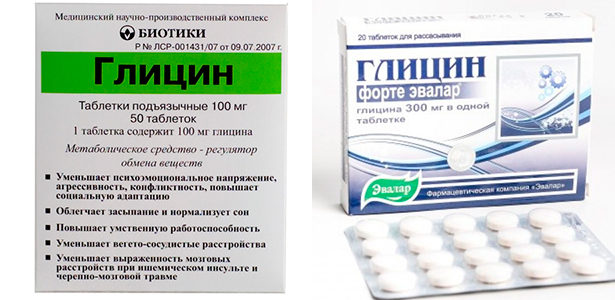
Glycine Forte from Evalar has 300 mg of glycine, as well as a complex of B vitamins( B1, B6 and B12).This drug is not considered a medicine, but a bioadditive!
In Glycine-Kanon, the amino acid concentration is 2.5 times higher, so it is advisable to use it in the treatment of serious CNS disorders.
In Glycine-Bio, the dosage of the active substance is absolutely identical to that of the original Glycine, but the enterosorbent povidone is included in the formulation.
Glycine-Vis is intended for oral administration, rather than sublingual or buccal.Capsules containing 0.3 g of glycine and vitamins B1, B6( 1 mg each) and B12( 3 μg) are surrounded by a gelatinous membrane.This drug is not included in the official list of medicines.
For neurological diseases and CNS lesions, other nootropics may be prescribed:
- Anti-Front( helps with meteosensitivity);
- Intellan( appointed in case of cerebral circulation insufficiency);
- Armadine( shown with a variety of neurological disorders);
- Instenon( effective for the treatment of age-related disorders of cerebral vessels);
- Glutamic acid( recommended for congenital malformations - cerebral palsy and Down syndrome, as well as for organic lesions of the central nervous system);
- Tryptophan( prescribed for relief of anxiety and depression);
- Elfoonat( allows to restore blood flow in the brain pool and stimulate cognitive function after CCT);
- Mexidol( effective in treating the effects of discirculatory disorders, including strokes);
- Neurotropin( prescribed for disorders of cerebral circulation);
- Cerebrolysin( indications for use are mental illnesses and neurological pathologies).
Plisov Vladimir, medical reviewer


